In today’s digital age, the security of critical infrastructure is of paramount importance. Organisations must be prepared to safeguard their systems and networks from potential cyber threats. Alongside security measures, having a robust disaster recovery plan is essential for ensuring business continuity.

This article explores the significance of critical infrastructure security and disaster recovery, highlighting the importance of cybersecurity course and ethical hacking in maintaining a secure environment. With the speedy digitization of critical infrastructure, the risks associated with cyber threats have increased significantly. Cybercriminals mark indispensable services such as power grids, conveyance systems, and healthcare facilities to disrupt operations, cause financial loss, and compromise public refuge. To protect these life-sustaining systems, organisations must borrow proactive protection measures and develop comprehensive disaster retrieval plans.
Understanding Critical Infrastructure
A nation’s or a system’s indispensable resources, systems, and networks are referred to as very decisive infrastructure. Energy, conveyance, water, telecommunications, and healthcare are just a few of the industries that are included. These systems’ disturbance or loss can experience serious repercussions, impacting not only the system but also the common public.
The Need for Security Measures
Given the interconnectedness of vital infrastructure, securing these systems is important. Cybersecurity measures help in detecting, preventing, and responding to potential threat threats, ensuring the confidentiality, wholeness, and availability of critical information. Robust security measures include firewalls, intrusion detection systems, encryption, approach controls, and regular certificate audits.
Challenges in Critical Infrastructure Security
Protecting critical substructures poses several challenges. Firstly, these systems often consist of legacy components that may not have been designed with modern certificate considerations in mind. Additionally, the interconnected nature of the vital base makes it vulnerable to cascading failures, where a single breach can have widespread consequences. Moreover, the evolving landscape of cyber threats requires constant monitoring and adjustment of security measures.
Role of Cybersecurity Courses
To address the increasing complexities of cyber threats, organisations should invest in a cybersecurity course. These courses provide professionals with the knowledge and skills necessary to discover vulnerabilities, mitigate risks, and respond effectively to cyber incidents. By equipping individuals with up-to-date knowledge of cybersecurity best practices, organisations can heighten their boilersuit security posture.
Ethical Hacking in Critical Infrastructure Security
Ethical hacking, also known as insight testing, plays a life-sustaining role in critical substructure protection. Ethical hackers feign real-world cyber attacks to key vulnerabilities and weaknesses in systems and networks. By conducting ethical hacking exercises, organisations can proactively identify and address potential security gaps before malicious actors tap them. The primary goal of ethical hacking is to mimic the techniques and methodologies utilised by malicious actors in a sweat to display vulnerabilities before they can be ill-used. Ethical hackers leverage a change of tools, techniques, and methodologies to test the robustness of an organisation’s certificate measures. They employ a systematic approach to identify weaknesses in networks, applications, and systems, which could potentially provide wildcat access or compromise the integrity and confidentiality of critical data.
Disaster Recovery and Business Continuity Planning
Disaster recovery and business continuity planning are crucial components of critical infrastructure security. These plans outline procedures and strategies to ensure the swift recovery of systems and minimise downtime in the event of a cyber attack or natural disaster. They involve regular data backups, redundant systems, alternate communication channels, and predefined roles and responsibilities.
Importance of Regular Testing and Updates
Regular testing and updates are essential for maintaining the effectiveness of security measures and disaster recovery plans. Organisations should conduct periodic vulnerability assessments, penetration testing, and simulations of various scenarios to identify potential weaknesses. Additionally, staying up-to-date with the latest security patches, software updates, and threat intelligence helps mitigate emerging risks.
Collaborative Efforts in Security and Recovery
Given the interrelated nature of critical infrastructure, collaboration among different stakeholders is essential. Public and very private sphere organisations, government agencies, cybersecurity experts, and industry associations should cooperate to portion information, best practices, and threat intelligence. Collaborative efforts heighten the collective resilience of critical infrastructure and enable timely response to certificate incidents. One key facet of coaction is the sharing of info, topper practices, and threat intelligence. By establishing channels for communication and knowledge exchange, organisations can benefit from the collective sapience and experiences of others. This sharing of information enables stakeholders to rest updated on emerging threats, evolving attack techniques, and effective protection measures.
Ensuring Compliance and Regulatory Standards
Adhering to compliance and regulatory standards is indispensable for maintaining the security and resilience of vital bases. Organisations must follow industry-specific regulations and frameworks such as NIST Cybersecurity Framework, ISO 27001, and GDPR. Compliance ensures that appropriate security controls are in place and helps organisations march their consignment to safeguarding decisive systems.
Case Studies: Successful Security and Recovery Measures
Examining real-world case studies of successful security and recovery measures provides valuable insights for organisations. By analysing past incidents and the corresponding response strategies, organisations can learn from best practices and adapt them to their environments. Case studies highlight the importance of proactive security measures, effective incident response, and continuous improvement.
The Future of Critical Infrastructure Security
As technology advances and cyber threats evolve, the future of vital base surety testament requires invariable adaptation. Emerging technologies such as unreal intelligence, machine learning, and blockchain contain the potential to enhance certificate measures and enable proactive threat especially. Organisations must stay abreast of these developments and invest in innovative security solutions.
Conclusion
In conclusion, ensuring the security and resilience of critical infrastructure is paramount in today’s digital landscape. Cybersecurity courses and ethical hacking play crucial roles in equipping organisations with the necessary knowledge and skills to protect their systems from evolving threats. Implementing robust security measures, developing comprehensive disaster recovery plans, and fostering collaborative efforts will help mitigate risks and ensure the continuity of critical services.
If you’re interested in pursuing a career in ethical hacking and cybersecurity, consider enrolling in Imarticus Learning’s Post Graduate Program in Cybersecurity to gain the skills and knowledge needed to succeed in this exciting field.
Visit Imarticus Learning to learn more.








